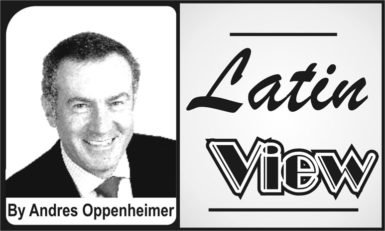If Hillary Clinton wins the November 8 elections, it will be because most Americans decided that it’s better to have a president who mishandles her emails than one whose mercurial personality would make it dangerous to put him in charge of the nuclear button.
Conversely, if Donald Trump wins the elections, it will be because Clinton is a non-charismatic politician, and because — after eight years of a Democrat in the White House — most Americans vote for a change, even if things are going relatively well in the country. Traditionally, in American politics, it is extremely difficult for the same party to win three elections in a row.
But, either way, the Hispanic vote — while very important — may not be the most critical factor in this election. This is because US elections are decided by the electoral college, based on each state’s electoral votes, and not by the national popular vote.
If US elections were decided by the popular vote, like in Europe or in Latin America, the 27.3 million eligible Hispanic voters in the country would be an almighty voting bloc. But the fact is that most US Latinos live in states that are already solidly Democratic or solidly Republican and are not up for grabs.
Fifty-two per cent of eligible Latino voters live in California, New York and Texas, which are not swing states. We already know that California and New York vote solidly Democratic, and Texas has a tradition of voting Republican. Nationally, Clinton leads among Latinos by with 67 per cent of the vote, against 19 per cent for Trump, according to a new Univision/ Washington Post poll.
So the Latino vote will really count in only three swing states: Florida, Nevada and Arizona, where eligible Hispanic voters account for between 18 per cent and 22 per cent of the voting population. If Latinos turn out massively for Clinton in these three states, that could make her the next US president.
That’s why Trump is not losing much sleep about the Latino vote at the national level, and why he didn’t hesitate to start his campaign with a June 16, 2015, speech in which he said that most Mexican immigrants are criminals and rapists.
His entire campaign was based deceiving statements — Mexicans are invading this country, free trade with Mexico is “killing” US jobs, the US economy is a “disaster,” etc — aimed at luring angry white voters. In reality, immigration from Mexico is way down from eight years ago, US manufacturing jobs have decreased because of robots, not because of Mexico, and the US economy is in much better shape than in 2008.
In addition, Latinos tend to vote in smaller numbers than the rest of the population. Only 49.9 per cent of eligible Hispanics voters voted in the 2012 elections, nearly 20 per cent less than African-American or Anglo voters, according to the Pew Research Center.
Early voting projections suggest that the “anti-Trump” effect has triggered a larger-than-usual turnout among Hispanics this year, but it’s not clear whether it will be a marginal increase, or an avalanche.
The Latino voting power’s electoral impact “has long been limited by low voter turnout and a population concentrated in non-battleground states,” a recent Pew Research Center study says. “Despite large growth in the number eligible Latino voters, it remains to be seen whether their turnout will set a record.”
My opinion: Anything could happen in today’s election, and it will be very important for Latinos to turn out in large numbers — especially in Florida, Nevada and Arizona — to show their distaste for the candidate who has called for massive deportations of Hispanics, and whose hate-filled rhetoric is emboldening neo-Nazi groups across the nation.
But in the end, Latinos alone will not save Clinton. This election will be decided by which of the two leading candidates is the least disliked, and by what voters consider to be worse — using the wrong email server, or building a campaign built on lies, racism and xenophobia, refusing to show federal tax returns, eroding democracy by threatening not to accept an adverse election outcome, and having a mercurial, authoritarian personality.





